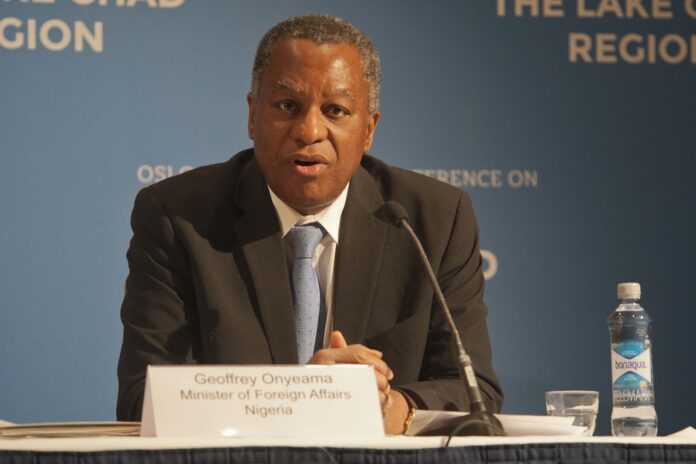The Federal Government has reaffirmed its commitment to ensuring rehabilitation and sustainable development in the Lake Chad Basin region.
Minister of Foreign Affairs Mr Geoffrey Onyeama said this in Abuja while addressing a delegation of the Lake Chad Basin Commission (LCBC), the African Union, and the United Nations Development Programme (UNDP) on Regional Stabilisation Strategy (RSS).
According to him, the briefing is the outcome of an important meeting with delegation of the Lake Chad Basin undertaking sensitisation campaign for regional stabilisation in the region.
“We know that the humanitarian and military security challenge of the Lake Chad Basin region is something that impacts very harshly on the four Lake Chad Basin countries.
“The countries are Nigeria, Niger, Chad, and Cameroon. The purpose of this campaign is to sensitise not only actors within those four countries, but also international partners.
“These include UN, AU, and bilateral partners towards efforts that are being made to coordinate the stabilisation objectives of those four countries, and harmonise programmes of the various levels.
“What this means is getting all the actors from the four countries at various levels to key in and approach the programme, by working on the same template.
“This is key and it will provide policy makers opportunities to accurately cost this and mobilise resources to address issues on rehabilitation and promotion of development in the region,” Onyema said.
Amb. Mamman Nuhu, Executive-Secretary and Head of Mission of Multinational Joint Task Force of LCBC said that awareness strategy had been initiated to sensitize member countries.
Nuhu added that the strategy had become important to ensure that stabilisation principles were provided as guide, in terms of implementation within affected countries of the Lake Chad region.
According to him, although governments of affected states are principal actors responsible for the development of national action plans, there should be ownership, coordination, and support by Federal Governments.
“This will ensure that proper planning and implementation of the territorial action plans are integrated in strategies and programmes, and government get support for initiatives that fall outside their competencies.
“The strategy seeks to establish inclusive framework for stakeholders to support coordinated and effective transition from stabilisation to recovery, and resumption of stalled development processes affected by Boko Haram insurgency.
“It is that spirit that the LCBC, in partnership with AU and the UNDP has undertaken series of high level engagements to create relevant awareness of the strategies among affected countries and deepened understanding by policy makers for seamless incorporation into various national and state development plans,” Nuhu said.
In his remarks, Dr Chika Aniekwe, a Policy Analyst and Researcher, described the strategy as a five-year initial long-term plan.
According to him, the inception phase of the strategy began in 2019, while the implementation phase commenced in 2020.
“At the end of the five years there will be stock-taking and an overview of the way forward,” Aniekwe said.
News Agency of Nigeria (NAN) reports that high point of the event was the presentation of documented framework for regional stabilisation in the Lake Chad region by Amb. Nuhu to the Minister.
The Lake Chad basin, located in Northern Central Africa, covers almost 8% of the continent and spreads over seven countries.
About 20 per cent of the total area of the Lake Chad basin, or 427500 km2, is called the Conventional Basin (42% in Chad, 28% in Niger, 21% in Nigeria, and 9% in Cameroon), which is under the mandate of the Lake Chad Basin Commission.
This commission was created in 1964 by the four member states with the objective of ensuring the most rational use of water, land, and other natural resources and to coordinate regional development.
In Nigeria, two sub-basins drain into the lake: the Yedseram/Ngadda sub-basin to the south and the Hadejia/Jama’are-Komadougou/Yobe sub-basin to the north.




